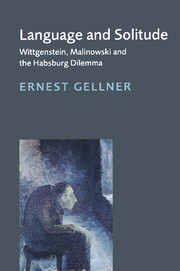Book contents
- Frontmatter
- Contents
- Preface
- Foreword
- Part I The Habsburg dilemma
- Part II Wittgenstein
- 10 The loneliness of the long-distance empiricist
- 11 The poem to solitude, or: confessions of a transcendental ego who is also a Viennese Jew
- 12 Ego and language
- 13 The world as solitary vice
- 14 The mystical
- 15 The central proposition of the Tractatus: world without culture
- 16 Wittgenstein mark 2
- 17 Tertium non datur
- 18 Joint escape
- 19 Janik and Toulmin: a critique
- 20 The case of the disappearing self
- 21 Pariah communalism
- 22 Iron cage Kafka-style
- Part III Malinowski
- Part IV Influences
- Part V Conclusions
- General bibliography
- Bibliographies of Ernest Gellner's writings on Wittgenstein, Malinowski, and nationalism
- Index
12 - Ego and language
Published online by Cambridge University Press: 05 March 2010
- Frontmatter
- Contents
- Preface
- Foreword
- Part I The Habsburg dilemma
- Part II Wittgenstein
- 10 The loneliness of the long-distance empiricist
- 11 The poem to solitude, or: confessions of a transcendental ego who is also a Viennese Jew
- 12 Ego and language
- 13 The world as solitary vice
- 14 The mystical
- 15 The central proposition of the Tractatus: world without culture
- 16 Wittgenstein mark 2
- 17 Tertium non datur
- 18 Joint escape
- 19 Janik and Toulmin: a critique
- 20 The case of the disappearing self
- 21 Pariah communalism
- 22 Iron cage Kafka-style
- Part III Malinowski
- Part IV Influences
- Part V Conclusions
- General bibliography
- Bibliographies of Ernest Gellner's writings on Wittgenstein, Malinowski, and nationalism
- Index
Summary
The Tractatus was the simultaneous expression of two kinds of anguish: that of the solitary explorer of the world propelled into ‘cosmic exile’ and finding himself in total solitude, and that of the Man Without Qualities, without any attributes imposed on him by his roots: lacking roots, and so lacking any genuine identity, he is doomed to opportunist volatility, superficial emulation of others, and self-hatred. The distinctive trait of Viennese individualist empiricism of the terminal decades of the Habsburg Empire was the intensity with which it combined these two elements. But there is another duality which can also be discerned in the Tractatus: alienation through the solitude of the self, and alienation through the inert superficiality of language. Let us turn to the latter, because the former has already been discussed above.
The Tractatus is a squeal of pessimistic woe, an expression of despair. What, strangely enough, the so very numerous commentators have failed to spot is that it contains two totally independent paths to despair. Either would be quite sufficient on its own, neither needs the other, though possibly they reinforce each other. This dualism, as we are stressing, is crucial when we examine the manner in which the ‘later’ Wittgenstein escaped the gloom of his earlier position.
One of the two paths leads through the nature of language. Speech, being bounded by the range of logical forms available to it (and revealed to us through modern logical notation), is only capable of echoing, mirroring, the structure of inert, pointless, meaningless and isolated ‘facts’.
- Type
- Chapter
- Information
- Language and SolitudeWittgenstein, Malinowski and the Habsburg Dilemma, pp. 59 - 61Publisher: Cambridge University PressPrint publication year: 1998



